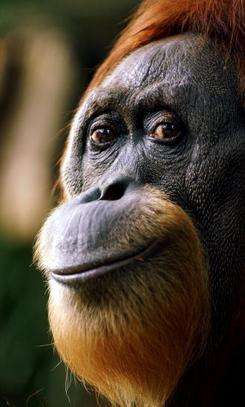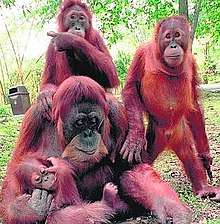Ah Meng
Ah Meng (circa 18 June 1960 – 8 February 2008) (Chinese: 阿明) was a female Sumatran orangutan and a tourism icon of Singapore. She was smuggled from Indonesia and kept illegally as a domestic pet before being recovered by a veterinarian in 1971. She was then eleven years old and was given a home at the Singapore Zoo.
 Ah Meng, an icon of the Singapore Zoo | |
| Species | Pongo abelii |
|---|---|
| Sex | Female |
| Born | 18 June 1960 Sumatra, Indonesia |
| Died | 8 February 2008 (aged 47) Singapore Zoo |
Ah Meng was the head of her small clan, which lives in a large enclosure with about twenty other orangutans. She had five children and became a grandmother in 1990.
She belonged to the Sumatran orangutan species, a rarer breed of orangutan now critically endangered due to illegal logging and poaching. There are about only 7,500 Sumatran orangutans left in the wild in the rainforests of Sumatra, Indonesia. Ah Meng died on 8 February 2008.
Celebrity life

(from left) Satria, Sayang and Riau
Ah Meng was the poster girl of the Singapore Zoo. Pictures of her have been used in Singapore's tourism advertisements worldwide. She has also been featured in over 30 travel films and more than 300 articles. Some of the foreign dignitaries and celebrities that visited Ah Meng included Prince Philip, Michael Jackson and Steve Irwin.
Due to her early years being raised by a family, Ah Meng was more approachable by humans than other primates in her clan. Due to her interactive nature, she was the first to host the zoo's 'Breakfast With Ah Meng' programme, whereby visitors would eat their morning meal and then have a photograph taken with the orangutan. By allowing visitors to interact closely with Ah Meng and other orangutans, the Singapore Zoo aims to raise public awareness of the importance of preserving the orangutan's natural habitat as well as of other environmental issues.
In 1992, the Singapore Tourism Promotion Board conferred Ah Meng a "Special Tourism Ambassador" award in recognition of her contribution to tourism in Singapore. She was the first non-human recipient of the award. She received a certificate and a stack of bananas.
Ah Meng was specially featured in the Singapore Guide book of 1988, The Singapore Treasury by Andreas and Carola Augustin.
As she aged, her public appearances became less frequent for fear of subjecting her to stress.
Incidents
- In March 1982, during the shooting of a promotional video at MacRitchie Reservoir, Ah Meng climbed a tree and stayed there for two nights. On her way down, she fell seven stories and broke her right arm.[1]
- In March 1992, Ah Meng attacked a French female research student who was studying orang utan behaviour and spent much time with Ah Meng's long-time keeper, Alagappasamy Chellaiyahy.[1]
Death
Ah Meng died on 8 February 2008 due to old age. She was 47 years old, or 95 orangutan years, and was survived by two sons, Hsing Hsing (who died of diabetic complications at the Perth Zoo in 2017) and Satria, and three daughters, Medan, Hong Bao (Named for the red envelopes given to relatives during Chinese New Year, and the reddish hair orangutans have), and Sayang (a Malay word term similar to darling in English), as well as six grandchildren.
On 10 February 2008, a memorial service for Ah Meng was held before a crowd of 4000 visitors at the Singapore Zoo.[2][3]
As a tribute to her, the next orangutan born at the Singapore Zoo will be named Ah Meng Junior. A durian tree will be planted at her grave because durian was her favourite fruit. A life-sized bronze statue forged in her image was also unveiled. Ishta was chosen to be Ah Meng Junior.
See also
- Inuka, polar bear mascot of the Singapore Zoo
- Omar, White Tiger of the Singapore Zoo
References
- "The life and times of the zoo's most famous resident". Asiaone. Retrieved 5 September 2012.
- "4,000 visitors bid farewell to celebrity orang utan, Ah Meng". The Straits Times. Archived from the original on 13 February 2008. Retrieved 10 February 2008.
- Lian Yi, Ho (9 February 2008). "Ah Meng Dies". Singapore Press Holdings. The Straits Times. Archived from the original on 26 December 2014. Retrieved 12 January 2015.